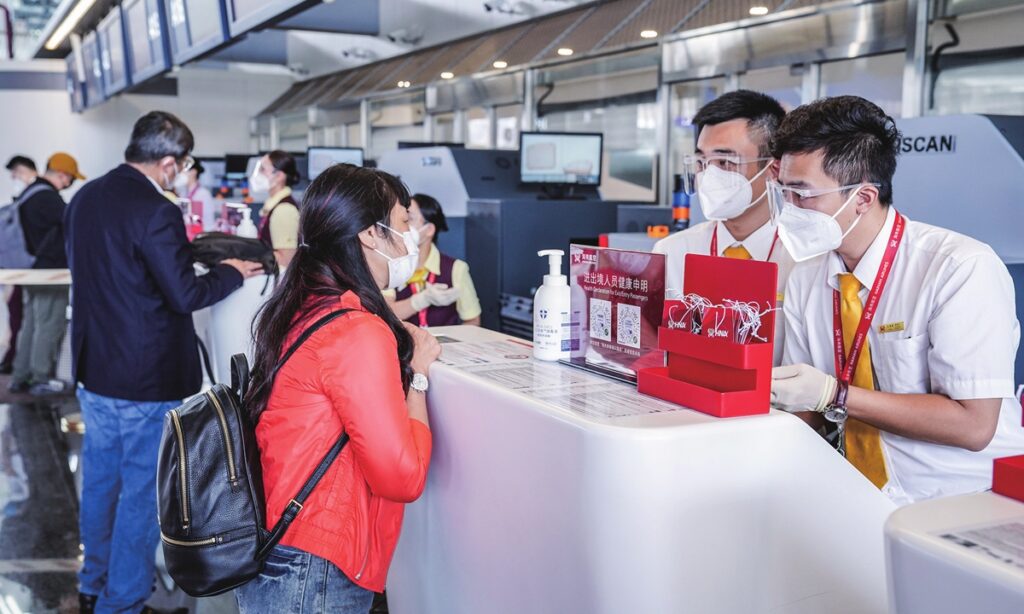News of shortened inbound quarantine in Chengdu sparks discussion despite no official confirmation
At least some quarantine hotels in Chengdu, capital city of Southwest China’s Sichuan Province, have reportedly shortened the centralized quarantine time for travelers from overseas from five days to two days upon arrival, media reports said.
Although no official announcement has been made by Chengdu authorities, the news sparked speculation over whether China will further relax its quarantine policy for inbound travelers soon.
China will roll out more measures to facilitate cross-border travel in light of the evolving situation, Mao Ning, a spokesperson of the Chinese Foreign Ministry, said at Wednesday’s press briefing when asked by a reporter over whether China plans to adjust its quarantine policy for inbound travelers soon.
“We have made important contributions to maintaining the stability of the global industrial and supply chains by optimizing visa policies, increasing international flights in an orderly manner, and simplifying remote prevention and control measures to facilitate people-to-people exchanges. We will make cross-border exchanges more convenient in light of the circumstances,” Mao said.
Many people who returned to Chengdu recently shared their experience of quarantine on social media. Some reached by the Global Times confirmed that they only had two days of centralized quarantine and then they were free to go home. Yicai, a Chinese media outlet, also reported on the news of shortened quarantine time in Chengdu.
“Those who tested negative for COVID-19 already left quarantine on Tuesday after two days of quarantine,” a Qingdao-based businessman, who requested anonymity, told the Global Times on Wednesday. Chris travelled back from a business trip from Sweden and reached Chengdu via Hong Kong on December 18.
The businessman claimed to be among the first batch of inbound travelers who had two days of quarantine at Chengdu hotels. “We had some 250 passengers on the same flight from Hong Kong. Those who tested negative already left yesterday. We received one mandatory test at the airport and then one more test on December 19. Many who were previously supposed to quarantine for five days left on Tuesday as well.”
He told the Global Times after the two days of quarantine, travelers need to sign a letter of commitment, which requires inbound travelers to do another six days of home quarantine.
But the Global Times reached several government departments and communities in Chengdu, and found no official policy adjustment has been released. “The current policy for inbound quarantine is still five days of centralized and then three days of home quarantine. There is no change about the policy,” a staffer at Chengdu Shuangliu International Airport told the Global Times.
It is believed Chengdu may be the first pilot city in China that has shortened its inbound quarantine period to two days. Government departments in Guangzhou and Shanghai both told the Global Times there is no shift in their quarantine policies.
Even though the official COVID-19 policy for inbound travelers remains five days of mandatory centralized quarantine followed by three days of isolation at home, home quarantine relies on people’s self-discipline.
“I was told to go home by myself after my five days of quarantine at a hotel. Previously, we were supposed to be picked up by community staff via closed-loop management,” Yu, who arrived in Beijing from Riyadh, Saudi Arabia via Abu Dhabi on December 14, told the Global Times on Wednesday.
“After my return, the community staff imposed no COVID-19 restrictions on me,” Yu said.
The loosening of COVID-19 rules for inbound travelers is believed to be the general direction ahead. Information that China will further ease and shorten the quarantine period for inbound travelers has been widely circulating online recently.
Starting from January 3, 2023, China will no longer take inbound travelers to quarantine facilities. The current quarantine policy will be optimized to only three days of home quarantine, according to Hong Kong Satellite Television. “This means that China will be fully open in the New Year 2023,” the report said.
Moves of airlines also hinted at an optimized policy for international travel. Juneyao Airlines on Tuesday announced the international key route operation plan for next year, including resuming all international routes and corresponding weekly flights.
The flights include routes to Japan and South Korea from Shanghai and Nanjing to Tokyo, Nagoya, Sapporo, Jeju island and other cities, as well as routes to Southeast Asia, according to The Paper on Wednesday. The company will also plan long-range intercontinental routes such as Shanghai to Athens, Brussels and other places, said the report.
(Global Times)




